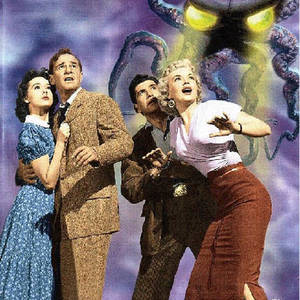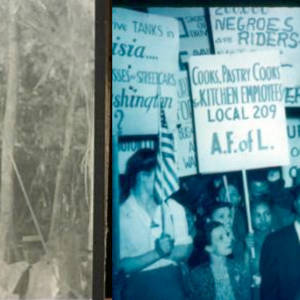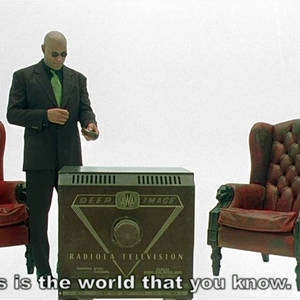Why has MTV produced a youth culture reality show that showcases Guido and Italian identity? Guido offers a symbol that specifically identifies the brand; Italian ethnicity makes the brand more salient. Guido combines a commodified youth party culture with a style that has street culture roots. [...]
Guido is a struggle for recognition and respect by an age fraction that privileges consumption rather than formal education, reflecting class differences in an ethnic culture that continues to evolve in metropolitan New York City and throughout the Northeast. [...]
Youth may turn more to ethnicity to authenticate their cool and preserve privileged insider status as in Hip Hop. However, this is denied by a vocal anti-defamation position that reduces Guido to a category of ethnic prejudice. It is my view that this slights a vernacular Italian American culture that ironically is better defined as a challenge to generalizations and stereotypes that underpin historic ethnic slurs.
You chose: jersey shore
-
-
-
On Saturday afternoon a hundred or so people, among whom several leaders of Italian-American associations, community activists, and elected officials, gathered at the Seaside Heights Community Center on Jersey Shore to voice their protest against MTV’s “Jersey Shore” reality show
-
This colloquium is not about the MTV show “Jersey Shore” and it does not justify it in any manner. This colloquium is about the phenomenon of the “Guido” that, regardless of its merits or lack thereof, has its origins and is associated with Italians in America. Whether one likes it or not, this component of Italian-American youth—an articulation of cultural expression, call it what one wishes—does exist. We are not asking anyone “to accept” this or any other “sub-culture” that may exist in the Italian-American community. Yet, precisely because this culture has been show-cased on television, and precisely because it has remained unknown to many, we need to be sure that we can speak to it in an informed manner.
-
Facts & StoriesThe Director of “Pane Amaro” (Bitter Bread), an acclaimed doumentary about the life and history of early Italian immigrats in the U.S., talks about whether sweeping dirt under the rug is the way to deal with undesirable facts. His film touched upon several diffucult topics, including he lynching of thirty-nine Italian immigrants across the United States between 1886 and 1916. “Occasionally you do find some people who, when faced with difficult, uneasy subjects, react by closing their eyes; they prefer not to know about them and even try to prevent you from talking about them. They use a metaphor, you know, they say that we shouldn’t ‘wash our dirty laundry in public’. And I think it doesn’t advance the conversation. I do believe that we need to explore difficult issues such as this."
-
'Guido' is a phenomenon that demands attention. If Italian American social advance were as real, as secure, and as substantial as many Italian Americans believe it to be (I am among these believers), then it would seem not only not harmful, but indeed positively beneficial and necessary, to examine, to discuss, and to reflect upon the power of such a new word. As to the youths of Jersey Shore, they are playing grotesques, like all minstrel-show caricatures. They are amusing—indeed, more so than most clowns with sad eyes. They have clearly found their moment and clearly touched a nerve. To the term Italian American, which has carried so many strings of dollar bills and ropes of sausage, they have added a new chain of fetishes – a tanning bed, a tube of gel, an old summer thong bearing the legend “I Love the Situation.”
-
-
Italian Americans should put an end to their obsession with their image in the television media. Television, in general, tends to caricature reality; it likes showing things that are over the top. This is not about Italian Americans—it is about the media, it's about "reality show." The controversy about MTV's Jersey Shore and the Calandra Institute's colloquium on the "Guido lifestyle" should not be resolved by censorship. It is only through dialogue that you are going to better understand these complex issues of ethnic identity and the media, and further the discussion. Censoring dialogue is always a dangerous act. It reveals a kind of ethnic nationalism that is only about pride and doesn’t allow for any kind of questioning or dissent.
-
The "Guido/Goomba/Cugine" is a very distinctive-looking, working-class East Coast Italian-American. The whole lifestyle may seem shallow or strange to some, but “authentic” Italian-American life does not have to revolve around formal language, Renaissance art or the opera. This is indeed a subculture that is very complex and needs exploration—not shunning and shame. There can be civil discussions about all these differences, but there should never be any mean-spirited debates on which is right or wrong.
-
What is this guido thing? Is it pure caricature put on us by the outside world, or do we have an active part in it? Is it lifestyle or demeaning stereotype? A (former guido) brother who now teaches environmental engineering, and a (longtime anti-guido) sister who is now an actress, writer and filmmaker, look back.






































